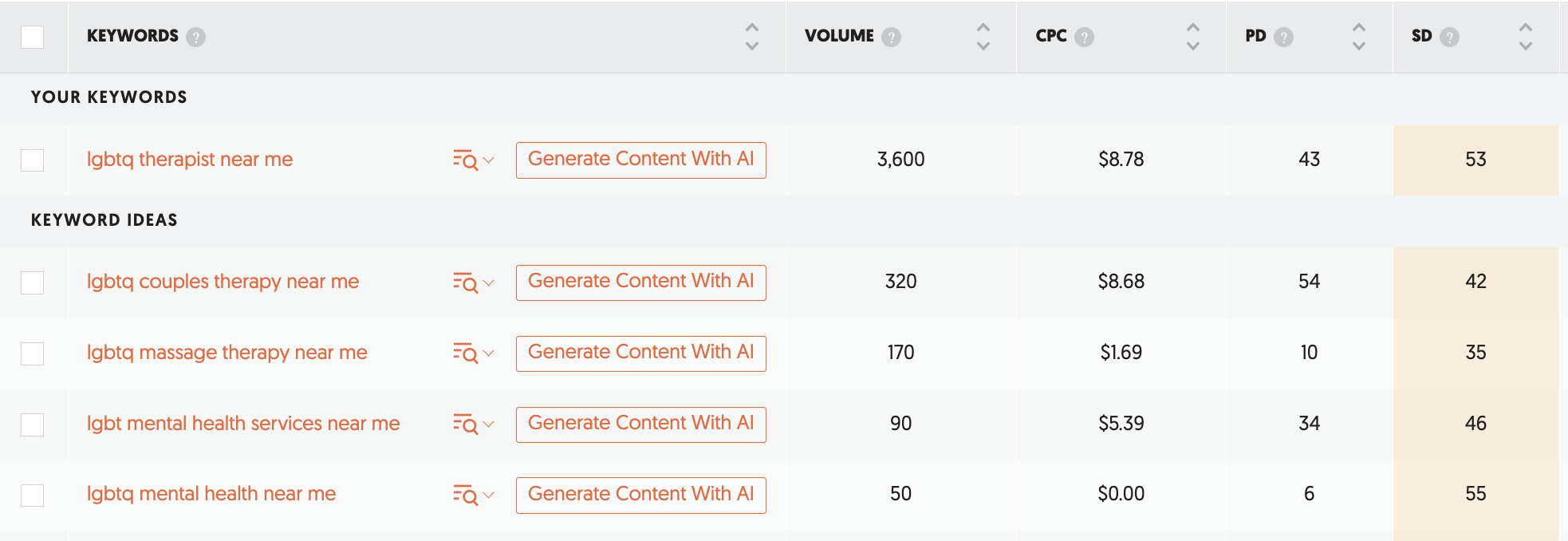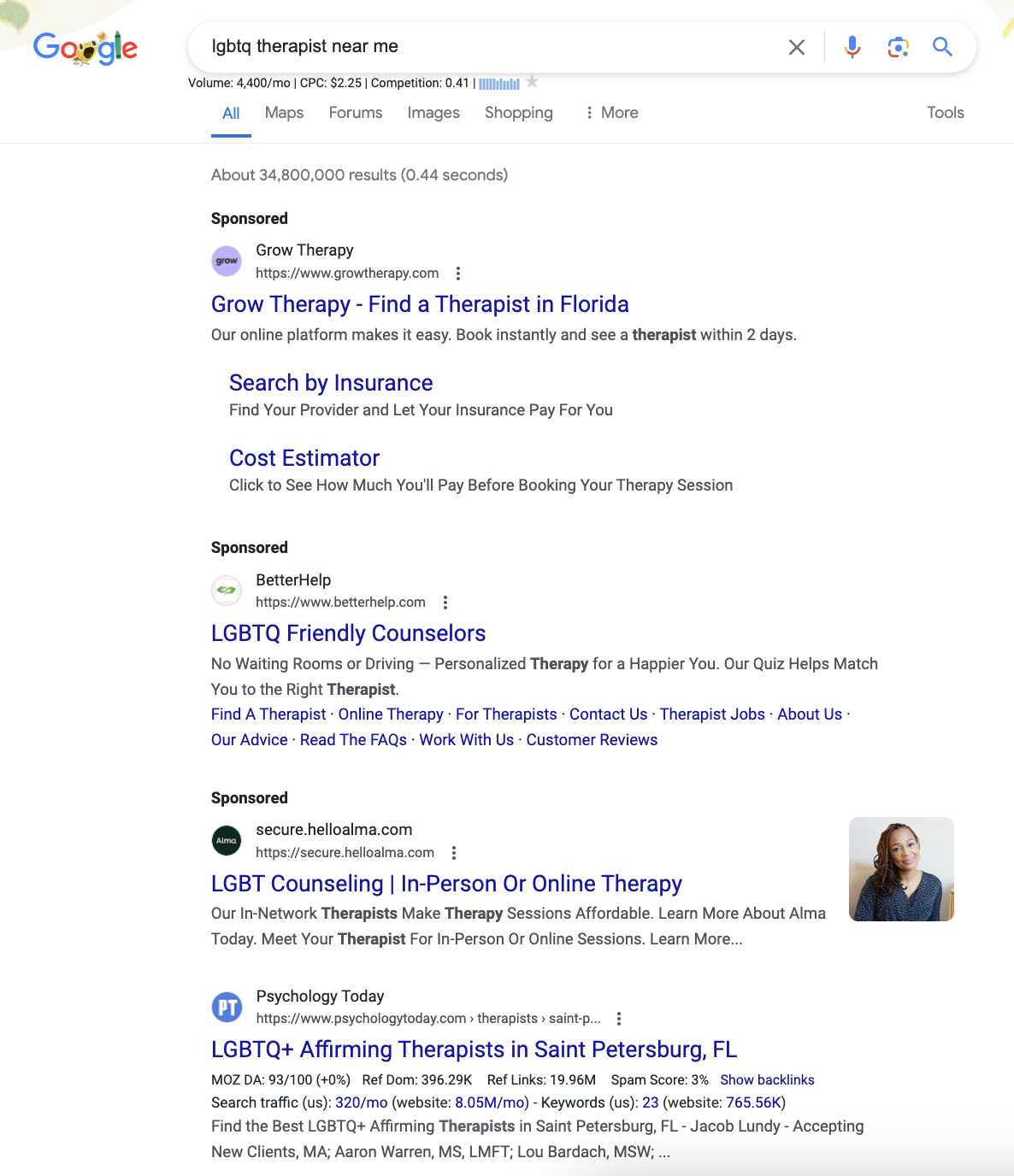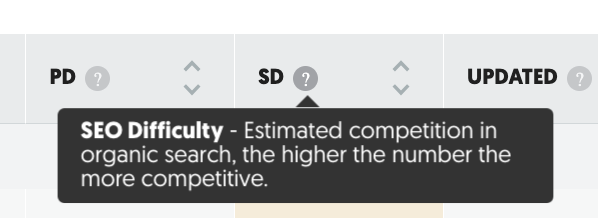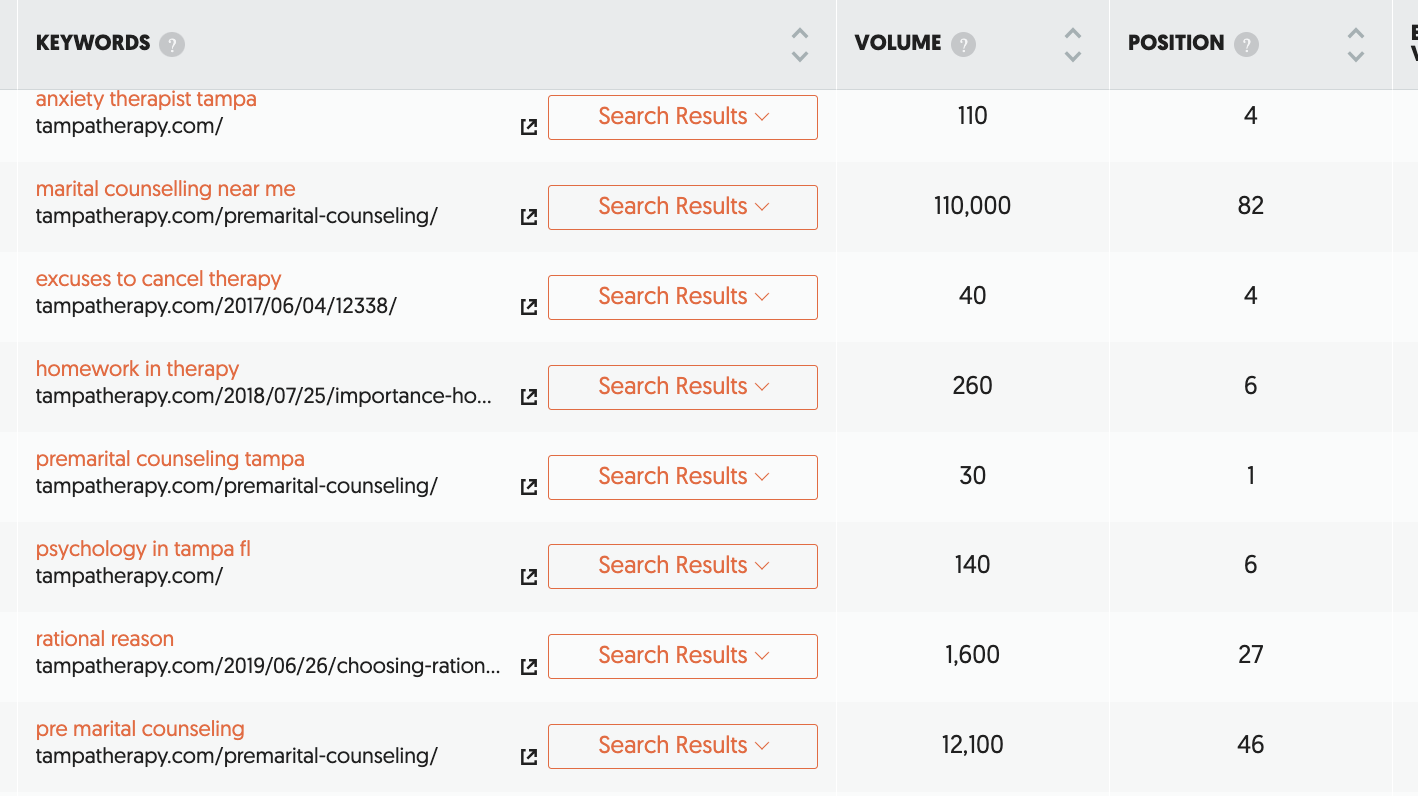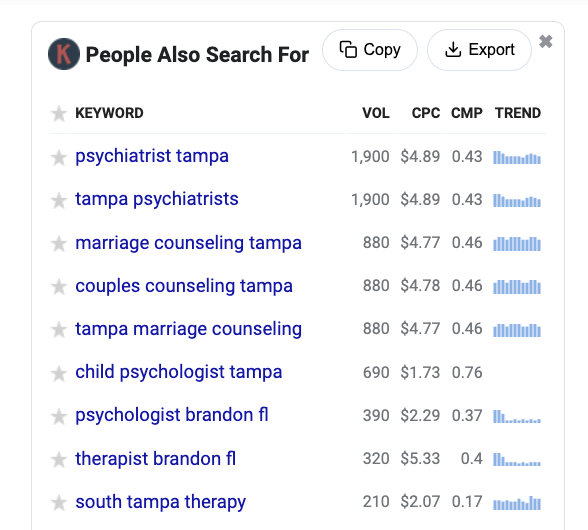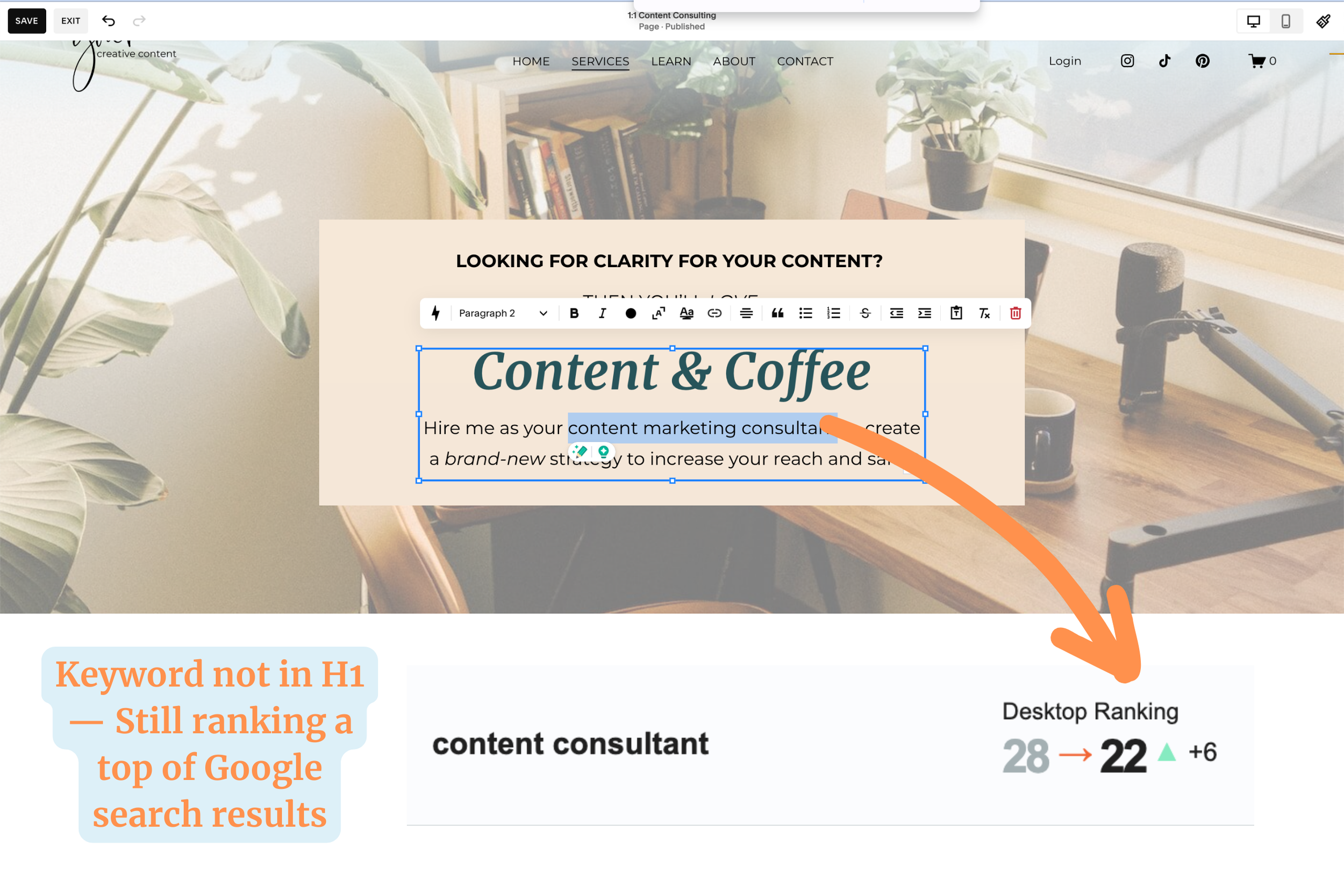SEO For Therapists: Get More Clients without Social Media
Right now, most of your patients are finding you through your Psychology Today listing or referrals.
You might be at 40% capacity with your caseload— but you want to be at 100%
Instinctually, you know that your next step would be to try to get clients through social media or paid ads.
Except you hate social media and don’t have the funds for ads (or you don’t understand how TF they work). Which is why you’re now considering SEO.
You smart cookie, you.
I’m going to show you exactly how SEO for therapists works and why you should use it.
What is SEO? The Short Version
You Googled “SEO for therapists” and found this blog, so obviously, you’re aware of the term “SEO” aka Search Engine Optimization.
Search engine: Google (or whatever you prefer)
Optimization: Creating content (like this blog) & sales pages based on certain keywords that have a high potential to show up on Google.
Can you guess the keyword I used for this blog? (HINT: I’ve used it twice already, and it’s in the title).
The steps that you took to read this are exactly how SEO works.
You had a problem.
You searched on Google to find a solution.
Now you’re learning how to put it all together (and you’re right where I want you, muhahaha!).
Now, I am going to show you how to DIY your SEO.
But if it seems too overwhelming and you want to outsource the SEO to moi, I can use this blog to soft sell you my services.
You can use this same strategy to get your ideal clients to find you and then soft-sell them your therapy services.
Is SEO worth it for therapists?
Let’s pretend I’m helping my LGBTQ+ friend find a therapist.
The first thing I’m going to do is Google “lgbtq therapist near me”
Let me show you something:
Keywords found using Ubersuggest
Look how many people search for LGBTQ+ therapists every month!
You’re missing out on hundreds, if not thousands, of people finding you (passively!!!) on Google.
But, I know what you’re thinking:
The top results are going to be ads and Psychology Today.
And you’d be correct:
But did you know that most people skip ads?
Only 2% of ads get clicks, compared to the top 3 organic search results, which get 10%- 40% of all clicks!
So, if your therapy practice shows up in spot #2 for “lgbtq therapist Tampa” (or wherever you live) and 1,000 people are searching that term every month, that’s 180 people clicking on your website every month!
At just a 1% conversion rate, that’s nearly 2 new patients every month or 24 new patients every year.
All without you having to post a damn thing on social media or spend money on ads.
Which Keywords Should Therapists Use?
Okay, to be fair!
You don’t want to use “therapist near me” as your keyword.
You want to use specific keywords like “Cincinnati Therapist” or “PTSD Therapist in Colorado.”
The more specific, the better.
Where To Find Keywords
When you’re picking keywords for your therapy practice, you want to use tools like Ubersuggest, like I did above (I’ll recommend others later, but this is what I use to get my clients 10K-100K monthly website visits).
When picking keywords, you want to look at the:
Monthly search volume: Aim for 0-2K monthly searches to start.
SEO Difficulty score or SD: Aim for under 50 (the closer to 0 it is, the easier it will be for you to show up on Google).
The keywords with 10,000 monthly searches and a 35 SEO Difficulty score? Those are your golden ticket keywords!
Disclaimer: When you use keyword research tools, you might find that the more specific keywords (like the “PTSD therapist in Colorado” example above) say the keywords are easy to rank for, but they get 0 searches every month.
Here’s why that’s a good thing:
It means less competition for you;
The keyword tool is probably wrong.
People in Colorado are obviously searching for therapists. That’s why these tools are meant to be used as a guide— they’re not 100% accurate.
I highly recommend reading this blog on why you should target 0 search volume keywords (it’s basically points 1 and 2 above, but this will help you understand it fully).
Where To Use Keywords
I always recommend optimizing your website “Money pages” first. These are the pages that are going to bring you the most money the fastest.
That means adding keywords to your:
Homepage (here’s mine)
Services/Package page (here’s mine)
Individual sales pages (here’s one of mine)
How To Pick Keywords For Your Therapist Website
Let’s start with your homepage.
You want your homepage keyword to be a bit more broad. If you specialize in a certain type of therapy, I recommend using that + your city.
For example: Behavioral therapist in Nashville, Tennesse
But if you offer therapy for a variety of groups (LGBTQ, women, PTSD), you should be targeting your city + profession as your homepage keyword.
For example: Nashville, Tennesse Therapist / Therapist in Nashville, Tennesse
You’ll use the more specific keywords in your sales page later.
Keyword Tools For Therapists
These are the 3 I’m going to recommend because they are the 3 that I actually use to get my clients results like this.
My Top Choice: Ubersuggest
It gives you a list of alternative keywords to use in case the one you thought of is too competitive.
They acquired Answer The Public so you can easily see what other types of questions your ideal client has and then create content with the answers!
It lets you spy on your competitors to see which keywords are working for them like I did below (yes, you should absolutely steal them).
My Secondary Tool: Keywords Everywhere
I always have this extension installed on my computer because then I can immediately see:
Keyword search volume
Cost Per Click
People also search for
Whether the keyword is trending or not
Keywords Everywhere
My “Just Because” Tool: Keysearch
Keysearch is my backup SEO keyword research tool. To be honest, sometimes, it might give you completely different data than Unersguggst (remember: they aren’t 100% accurate!).
But I like to use it because you can find keywords for a variety of platforms (not just Google):
Google
Bing
YouTube
Etsy
Amazon
Pinterest
You’ll see these SEO tools recommend a lot, but here’s why I don’t recommend them:
Google Keyword Planner: It’s free, yes. But it will tell you the monthly search volume is 0-10K. Not specific enough for me!
Ahrefs or SemRush: These are great tools for marketing agencies— but they’re not necessary for small business owners. Hell, I run an SEO company and even I don’t use them.
Google Search Bar: You can see how many posts have been made, but it won’t tell you how competitive (the SEO Difficulty score) the keyword is. I’m all about concrete data, baby.
6 SUPER Easy SEO Steps Therapists Can Take Today
Step 1: Pick Keywords For Your Money Pages
We already went over picking your home page keyword. But you also want to optimize your:
About Page: With the name of your practice or your name.
Package page: This is a general landing page with links to all of your different therapy services. Again, here’s mine as an example. You’ll want to target keywords like “therapy services in Tampa” here.
Sales pages: This is when you’ll create sales pages for important keywords targeting specific services (e.g., “PTSD Therapist in Colorado” or “LGBTQ+ therapy services in Tampa”). These pages need to have PROFESSIONAL COPY if you want to see conversions.
Step 2: Give Them Unique Titles & Meta Descriptions
Where you edit this is going to look different depending on what platform you use.
But generally, you can find the SEO metadata under Pages > Settings (or this icon ⚙) > SEO
Think of the titles like your social media hooks. You need to stand out to get people to click.
You can do this by using:
Storytelling: Tampa Therapist To Help You Overcome Anxiety
Call To Your Hero: Tampa Therapist for the LGBTQ+ Community
Your meta description is the second place you should use your keyword, but it’s also where you can touch on your client’s ultimate desire.
Meta description example: Your life doesn’t have to be exhausting. As your Tampa therapist, I’ll help you deal with your anxiety so that every day stops feeling overwhelming.
Step 3: Use Your Keyword in ONE H1 Heading
Your H1 heading is going to be the biggest text you see at the TOP of each page.
This is called the Hero Headline, and it should always, always, always be formatted as an H1, like you see in my Service page example above.
Ideally, this is where you use your Main Keyword. However, if it doesn’t fit naturally, you can always use it in the body paragraph or the subheading, which you can format as an H2 above your H1.
Yes, you can still rank.
I see the typo. Let’s move past it…
Step 4: Optimize Your Copy with Keywords— Sparingly
The point of your website is to bring traffic (which you do with keywords) and convert those visitors into warm leads.
The way to get traffic is to put your keyword in these 4 places on your sales page:
H1 Heading (x1)
H2 Heading (x1)
In the body paragraphs (x1)
Alt image description (x3)
But even if your sales page appears at the top of Google search results, the only way you’ll generate leads or sales is if your copy is solid.
It’s too much to go into in this blog. But if you want to see how I write SEO sales page copy, I have a template for that.
This is the exact same template I used to get 80% of my sales pages on page 1 of Google, including this one, which brought me over 150+ leads for my content repurposing service.
Step 5: Alt Image SEO
This is where you’ll go onto each image of each “Money Page” and try to inject your keyword naturally.
The point of Alt Image descriptions is so that online surfers who have disabilities can have the computer read them everything on the screen… including your pictures.
So you don’t want to keyword stuff your alt image SEO by describing the image as “Tampa therapist” over and over again.
Instead, you want to describe the picture and use the keyword naturally if it makes sense.
For example, the Alt Image SEO description of your professional headshot that appears on your homepage could say, “Headshot of Jane Smith, a Tampa therapist specializing in PTSD behavioral therapy. She’s wearing a white button-down shirt that is partially covered by her long brown ponytail.”
You only need to add your keywords on a handful of your images (like 3-5).
Step 6: NAP
NAP Example
NAP stands for Name, Address, and Phone number.
You want this in the footer of your website so that it automatically appears on every page (like in the example above).
If you have multiple locations, make sure they’re in there!
If you’re virtual, simply list where your business is located. This is also a great place to use alternative keywords (you’ll learn about this in my SEO Copywriting Sales Page template), like “Therapist for creative entrepreneurs.”
Extra SEO Steps To Consider
I know that all sounds like a lot, but you can get all of that done within a day.
That’s why I’m able to rewrite your entire website (with SEO) within a week. I tackle 1 page of your website every day until it’s fully optimized for search engines and your copy is primed for conversions.
If you optimize your sales pages and your website is still taking forever to get traffic, try these extra steps to help boost your website’s authority:
Start a blog
This might be the last thing you want to hear if you hate writing.
If that’s the case, check out my ChatSEO mini-course. It’s gonna save your life.
But if you prefer writing over video, blogs will bring you a ton of traffic. You only need to post one piece of content per week.
AND!
You don’t have to show up on video.
Use my Free SEO blog template (the one I’m using right now as I write this) to get started.
This template can also work to SEO your podcasts and YouTube videos!
Don’t let anyone tell you blogs are dead.
One of my clients went from 164 to 1,111 monthly website clicks in under 4 months, and, in their own words, their phones have been “ringing off the hook.”
Optimize Your Social Media Titles
Social search is starting to pick up, but it’s not as good as Google SEO yet (okay, TikTok’s SEO is pretty fab).
Here’s a guide on Instagram SEO.
The TLDR: Use the keyword you used on your homepage in your Instagram, LinkedIn, and TikTok bios.
Yep, that’s literally it.
Off-Page SEO
Finally! This is your last step to mastering SEO as a therapist.
It’s the last one, I swear.
Off-page SEO includes things like getting backlinks, such as having your website mentioned in Psychology Today or having a link to your blog in a podcast description where you appeared as a guest.
This tells search engines that you’re a pretty big deal, and they should recommend your site more.
After all— other websites are!

